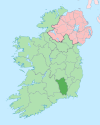Piltown
Piltown
Baile an Phoill | |
|---|---|
Village | |
 Sham Castle, Piltown | |
| Country | Ireland |
| Province | Leinster |
| County | County Kilkenny |
| Elevation | 10 m (30 ft) |
| Population | |
| • Total | 1,187 |
| Time zone | UTC+0 (WET) |
| • Summer (DST) | UTC-1 (IST (WEST)) |
| Irish Grid Reference | S456226 |
| Website | www |
Piltown, historically known as Ballypoyle[2] (Irish: Baile an Phoill), is a small village in County Kilkenny, Ireland. It lies on the R698 regional road, which was the N24 national primary road before the locality was bypassed in 2002.
Approaching Piltown from Carrick-on-Suir in the west is the landmark of "the Tower" ( Sham Castle ) which forms a roundabout in the road. This monument, dedicated to the son of a local landowner, dates back to the Napoleonic era. Today its upper section serves as a water tower.
Piltown is also home to Ireland's largest Horticultural and Agricultural College, Kildalton College and hosts a fair, called The Iverk Show[3] the fourth Saturday in August each year.
Piltown is a Local Electoral Area of County Kilkenny and includes the electoral divisions of Aglish, Ballincrea, Brownsford, Castlegannon, Dunkitt,Dysartmoon, Farnoge, Fiddown, Jerpoint West, Kilbeacon, Kilbride, Kilcolumb, Kilculliheen, Kilkeasy, Killahy, Kilmakevoge, Listerlin, Muckalee, Pilltown, Pollrone, Portnascully, Rathpatrick, Rosbercon Rural, Rossinan, Shanbogh, Templeorum, The Rower, Tubbrid, Ullid and Whitechurch.[4]
History
Piltown also has a unique place in English history as it was the only place on the island of Ireland to see a battle in the Wars of the Roses. In the Battle of Piltown (1462) Thomas FitzGerald, 7th Earl of Desmond, on the side of the House of York, defeated the Butlers of Kilkenny, fighting for the House of Lancaster, resulting in more than 400 casualties for the Butlers.[5] Local folklore claims that the battle was so violent that the local river ran red with blood, hence the names Pill River and Piltown (Baile an Phuill - Town of the blood).
From the early eighteenth century up until the late 1930s, the main landlords in Piltown and its surrounding area were the Ponsonby dynasty, Earls of Bessborough. The family seat was Bessborough House, just outside Piltown, built in the 1740s for the 1st Earl. The house was gutted by fire in February 1923, during the Irish Civil War. However, it was rebuilt in the late 1920s for The 9th Earl of Bessborough, who served as the 14th Governor General of Canada in the early 1930s. The 9th Lord Bessborough sold the house in the late 1930s. Bessborough House now forms the main part of Kildalton Agricultural College.
Education
Piltown is also home to Ireland's largest Horticultural and Agricultural College, Kildalton College.
Culture
Host Ireland's longest running fair, called The Iverk Show,[6] on the fourth Saturday in August each year. The Iverk Agricultural Show, started in 1826, was founded by a member of the Bessborough family. The family resided at Bessborough House, which is now Kildalton Agricultural College.
Twin towns
Piltown is twinned with the village of Mellac in France.
Sport
Piltown GAA club was initially formed as far back as 1887 and then reformed in 1953. The Club played in two Senior County Finals in 1904 and 1910. The original grounds were purchased from the Land Commission in 1947.
Piltown GAA club enjoyed one of its most successful years in 2003, winning the Southern Junior Hurling League (beating Tullogher Rosbercon), Southern Junior Hurling Championship (beating Tullogher Rosbercon), County Junior Hurling Championship (beating St. Patrick's Ballyragget after a replay), Leinster Junior Hurling Championship (beating St. Vincents of Dublin after extra-time) and were crowned AIB Kilkenny Club of the Year.

